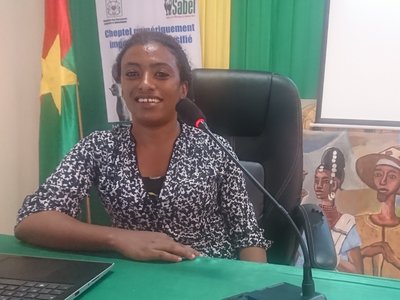

Within the frame of LocaBreed, Kahsa Tadel Gebre was invited to participate in a project meeting in Burkina Faso. As part of the event on bull selection she shared her experience in community-based livestock breeding. Kahsa gave a presentation on “Community-based breeding programs for small ruminants in Ethiopia: experience and up/out scale framework” in the Ministry of Livestock and Fisheries in Ouagadougou, Burkina Faso. Community-based breeding programs (CBBP) have been practiced in Ethiopia for the last 10 years. Local and international organizations in collaboration with BOKU successfully implemented small ruminant CBBP in eight villages of Ethiopia in 2009 for the first time. Strong commitment of governmental organizations, agricultural research centers and farmers who were willing to share genetic resources was very important for the success of the initiated breeding programs.
After the completion of the project, the Ethiopian government took part in scaling up of CBBP and small ruminant production has become a main line of business for breeders. Around 80% of the smallholder farmers graduated from the safety net program including food aid and increased income (average of 20%) from CBBP. Mutton consumption increased (now average of 3 sheep slaughtered per family per year compared to 1 at project start). Neighboring farmers are interested to join the cooperative and implement CBBP due to the feasible changes on animals’ performance and livelihood of farmers in CBBP.
The Ministry of Agriculture implemented this approach in the joint World Bank Livestock and Fisheries Sector Development Project (LFSDP) and allocated budget to up/out scaling of small ruminant CBBP in Ethiopia. CBBP are part of the Ethiopia Livestock Master Plan and transformation plan. Now the CBBP are expanded. Currently, 3200 households with more than 19,200 people in 40 villages are directly benefiting from the scheme. Negative selection has been reversed and more than 35 functional cooperatives are established. The main focus of Kahsa’s presentation was to show how CBBP are important for genetic improve of local livestock resources and the support of government is very crucial.
Kahsa Tadel Gebre is alumna of OeAD. She obtained her MSc in Animal Breeding and Genetics in 2009 at BOKU and completed her PhD in Animal Breeding and Quantitative Genetics in 2014, respectively.
